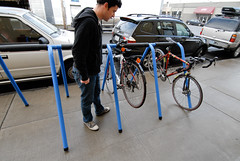
has sprung up to meet the local
demand for temporary bike parking.
(Photos © J. Maus)
A local bicycle and pedestrian planning firm has announced plans to update a groundbreaking study on Portland’s bicycle-related economy.
Back in March of this year, I reported that Mia Birk, a principal with Alta Planning & Design (a local firm with offices nationwide) was interested in expanding the Growth in Bicycle Related Businesses study, which she authored in 2006.

Southeast Portland offers repair
clinics and consultations for
businesses that want to be
more bike commuter-friendly.
That study (which was funded by the City of Portland) was one of the first of its kind in the nation and it generated a great deal of interest from national and local media, from tourism and economic development professionals, and others.
In a statement released Friday by Alta, Birk says she believes that study, “Proved that bicycling in Portland is a mature, well-supported industry that benefits all Portland residents and is a substantial part of our economy.”
And since 2006, Birk realizes there has been “exponential growth in bicycle ridership and bicycle-related businesses,” and predicts her new study will show “at least 20% growth” in Portland’s bicycle-related economy. “Our exponential growth in ridership over the last two years,” she says in the statement, “is creating larger markets for bicycle products and services.”

display here at a recent show, is
one of the strongest in the country.
In addition, Alta is seeking statewide information, to gauge the impact of bicycling on Oregon’s economy. “Clearly, bicycle tourism and commuting are on the rise statewide, benefiting communities across the spectrum.”
In tandem with the launch of study update, Alta has created a new survey. If you own or represent a bicycle-related business, you can participate in the study by taking the survey below.
— Take the Portland Bicycle-related Business Survey —
The updated study is expected to be done by the end of August. Study partners include Cycle Oregon, Travel Oregon, City of Portland, BikePortland.org, the Initiative for Bicycle and Pedestrian Innovation (IBPI), and Bikes Belong.



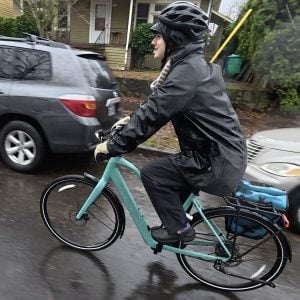
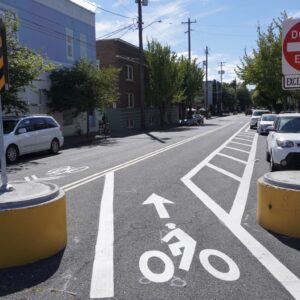
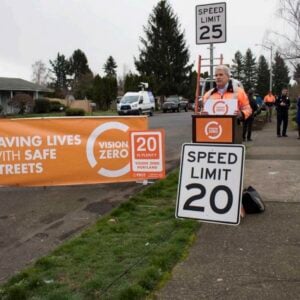
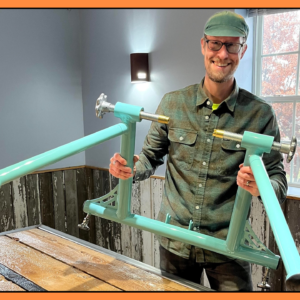
Thanks for reading.
BikePortland has served this community with independent community journalism since 2005. We rely on subscriptions from readers like you to survive. Your financial support is vital in keeping this valuable resource alive and well.
Please subscribe today to strengthen and expand our work.
Calculating cycling impact on the economy seems a daunting task. My head is swirling with dozens of categories to pursue. I\’ll mention what I think are the most interesting three:
1) Food.
Cyclists burn burritos and other food as fuel that they would otherwise not consume. How this might be approximated?
2) Clothing.
While it might be possible to get sales data from bike shops but what about all the clothing that isn\’t labeled as bike specific but was bought specifically to aid in commuting or racing. Tricky.
3) Coffee.
Maybe I\’ve been drinking the [cycling] cool-aid too long but there are things that I just don\’t do anymore if it requires driving. If my bikes were to vanish, how often would I stumble into a coffee shop and order coffee & associated treats? How would one calculate such a subjective and complex question?
I\’m very interested in seeing the methodology and results.
don\’t forget beer!
This sounds like when the tobacco companies have their own study group or the Oil companies launch their own research.
What happens to all that bike economy when the 5 months that almost no one rides a bike comes along. Hey on the other hand some one out there may do a study of how the meth industry is helping Oregon.
Which 5 months? I see commuters on bikes all year long in my stretch of the woods. What color is the sky in your world anyway?
It is odd that Mia can \”predict at least 20% growth\” before the study is even started. This seems to violate a few basic ideas of an independant study.
My concern here is that if enough studies are done that show what a great city we are, then growth in bike transit infrastructure may see a reversal and backlash by nonusers. We are getting credit we may not deserve by what appears to be a biased consulting firm with deep ties to the BTA, Earl Bleuminauer and others in the \”bike special interest group.\” This could ultimatly backfire on the people who ride bikes.
There are still a lot of people who do not ride bikes in this city. I sense a growing resentment from that sector of Portland lately.
We\’re not trying to calculate anything other than the gross revenue of bicycle-related businesses. As Zaphod notes, trying to calculate the total that bicyclists spend because of or related to bicycling is a very complicated issue. If you then coupled that with what cyclists spend because they\’re not spending that money on cars, it gets even more complicated (though also more interesting). We\’d love to see a study that attempted this high-level analysis, but that\’s not our current task. (See Joe Cortright\’s Green Dividend study for an example of a study that calculates the value of NOT driving.)
Chris, I don\’t think there\’s anything problematic about observing that there seem to be a lot more bike-related businesses around than in 2006. It seems to me that it would be hard not to notice all the new businesses (especially thanks to Jonathan\’s coverage). We are making the same level of effort to identify and contact bike-related businesses for this update as we did in 2006. If our impression is wrong and there are not actually more businesses in this sector, we will report that finding.
Jessica Roberts
Alta Planning + Design
\”What happens to all that bike economy when the 5 months that almost no one rides a bike comes along.[?]\”
Guess we need an independent research study to find out.
Response to #4
More bike hooks available on MAX and the sense that $4.00/gallon gasoline is a small price to pay for comfort and warmth.
Come October or November, we\’ll see the numbers of bike commuters return to more normal levels.
(I hope to be proved wrong but bike commuting is very attractive when it is sunny and dry. Not so much when the real Portland weather returns.)
Jessica, thank you for clarifying; I did misunderstand the study purpose.
But I have still am concerned that Alta Planning & Design was commissioned to do this study. They stand to benefit too much from the findings and are not unbiased. If the study finds benefits to the local economy, more infrastructure would likely be commissioned that would likely be designed by…Alta. It is a built-in conflict of interest.
Please don’t get me wrong here. I think Alta has brought us great things – bike boulevards in particular. But Alta\’s previous work for the city throws credible doubt as to the independent and unbiased findings of any study that Alta would execute.
But let\’s say that the study is fair and accurate. Even then, perceived impropriety alone could harm the credibility of the study results — and any resulting projects — in the eyes of non-bike riding Joe Taxpayer.
\”Yep\”, says Joe to his friends, \”those bike-freak-(insert your favorite derogatory noun here) have stuck it to us the taxpayer again. They used a biased study to steal our tax dollars.”
This seems like an unnecessary expenditure of political capital on the part of the bike lobby. It doesn’t have to be this way.
A fair and simple solution to this conflict of interest might be to separate the study from any work that might result from it. Problem solved. This is how the public sector normally keeps these types of conflicts of interest from occurring.
With all that said, I do hope the study does show just how much we have grown.
We\’re doing the study pro-bono because we and all the study partners (Cycle Oregon, Travel Oregon, City of Portland, BikePortland.org, the Initiative for Bicycle and Pedestrian Innovation (IBPI), and Bikes Belong) are interested to see the results. No tax dollars at work here.
All we\’re doing is finding every bicycle-related business we can and asking them to share their revenue figures, hiring, and growth trends with us. There\’s not a lot of room for fudging the numbers; we\’re not coming up with complex formulae or multiplier figures.
I don\’t see a conflict of interest; the result of our study will be a dollar figure of the gross revenue of the bicycle-related industry in Oregon. Hopefully that figure will be of interest to elected officials. We\’re not planning to make any recommendations as a result of the study such as the one you suggest (that more infrastructure should be built).
The most important thing that will help us be accurate is to hear from as many bike-related businesses as we can.
Jessica Roberts
Alta Planning + Design
I really don\’t see how there is much opportunity to insert misleading bias into a compilation of information. And whatever opportunity exists can be assessed by publishing the methodology along with the findings. Then it is up to the anti-bike fringe to point out specifically how the results are skewed.
Since this tiny but vocal minority typically uses arguments that rely on basic factual inaccuracies (e.g., transportation infrastructure funding sources), I\’m sure they will neither have the savvy to meaningfully dispute the results nor to consider any relevant evidence before spewing their vitriol.
Friends,
Alta\’s mission is to make communities more bicycle and pedestrian friendly. This is what we do, day in and day out. We love our work. We are making the world a better place.
The 2006 study, which we did for about $3000, put our bicycle industry on the national map. It showed that the investment we have made in bicycle infrastructure and promotion have translated into hard dollars and jobs. Since I was the bicycle coordinator for the City of Portland in the 1990s, I was particularly pleased by this. Our local framebuilders in particular got national attention from the New York Times to NPR. It got the attention of our decisionmakers, who then got PDC to put funding into the N.Am. Handmade Bike Show and the airport display. This helped increase bicycle-related business activity in the City even more. I talk to many business owners, most of whom report a large increase in revenue. This translates into more green jobs in our economy.
I am proud of what we have done here in Portland. I am proud of our industry, and I want to continue to show the world that bicycling is an important growing sector of our economy. That is why we are undertaking this study update.
There are a myriad of potential studies of the externalities side of things – the environmental and health benefits, for example. Our steering committee has discussed these ideas; the Initiative for Bicycle and Pedestrian Innovation at PSU is a potential lead for these studies in the future. In addition, Travel Oregon is working on an economic study of the value of bicycle tourism in the state.
Mia Birk
Myra, I\’m sure they\’ll do what any seasonal business does. Save. It\’s not that hard.
Bicycle ridership falls about 40% in the winter according to the bridge counts. I am curious how that translates into profit on the retail level: Dark/rain/cold riding requires a lot more equipment than summertime riding, and a lot of that equipment tends to wear out faster too, (not just jackets and lights, but chains and rims take a real beating in the rain.) Add to the fact that I don\’t think the average bicycle shop makes that much money on completed bicycles vs repairs and accessories, and I expect that the bicycle shop profits in the winter may not go down all that much…
Now, obviously, for things like Cycle Oregon, 11.75 month of the year is \”slow\” and then one week is crazy, and for frame builders booked several years out in advance, the difference between summer and winter is pretty much non-existent, but on the retail level…
Part of the the bike industry in Portland is manufacturing. I don\’t think it is effected by the drop in ridership over the winter months.
I know sales slows down on the bike shop level, but I don\’t think it is that drastic. Those who do ride are buying tires and other wear items, and rain gear. A lot of people use the winter months to build new bikes or fix up old ones, and then there is Christmas, and tax returns. Racer are putting their bikes on trainers and spinning away indoors. There may not be as many bikes on the road but there is plenty of bike activity.
Thank you Mia for all the work that you do.
I do think Alta has done great things. Thank you again Mia. I agree with all many have said about Alta.
But I fear the potential outfall from people who do not share our love of all things bike in a case like this. A study that potentially benfits a commercial, money making firm, including Alta, opens the results to doubt, loss of credibility and long term influence.
a.O, I would not take lightly the intelligence of the vocal minority — they are voting people and in actuality are in the majority — all it takes is a mobilizing event. Such as spending funds based on a questionable study done by \’insiders\’. The fact that the study is free or pro bono makes it all the more questionable. Nothing is ever free…
If anyone thinks there is no way a study can be biased, please look at studies that deny global warming exists, or GDP numbers that say inflation is under control at the moment. Both are excellent examples of the politicization of process to the exclusion of science.
The bike lobby has enjoyed a certain amount of benign neglect in the public eye. But more and more, I come into contact with people who openly express resentment, bitterness and fear of the politics of bikes in PDX. Like it or not, bikes are a lobby. I know Jonathan has expressed disappointment in this regard, but it\’s a fact. I fear that the vocal minority of the past is quickly being replaced by the resentful majority who cling to their cars without knowing any other way of living.
In the end, I guess we will have to agree to respectfully disagree. Time will ultimately be the judge. I do hope I am wrong, but I don’t think I am. I appreciate this forum and the respectful discussions here. But I also know when we have reached an impasse. Thank you for the intelligent, thoughtful discussion, and thank you Mia and Jessica for taking part; I never thought a principles at Alta would respond and it does speak to Alta’s character that you did.
VERY respectfully,
Chris